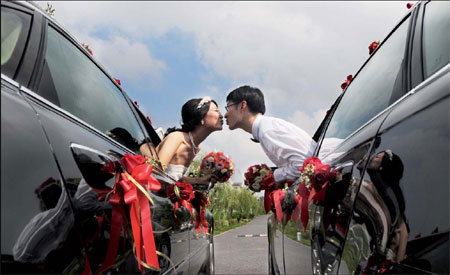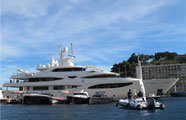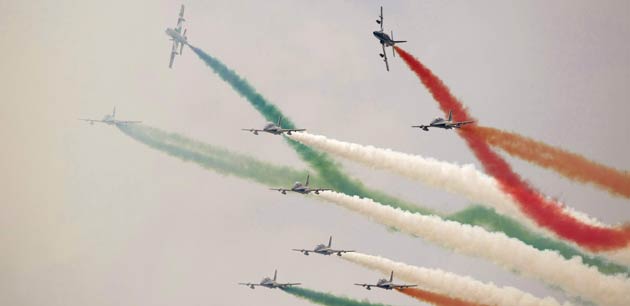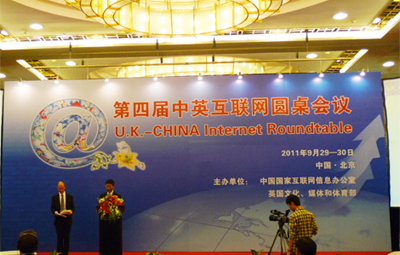Photographic bliss
Updated: 2011-09-30 09:19
By Yao Jing (China Daily)
|
|||||||||
|
Couples are now willing to splash out on wedding photos that are out of the ordinary. Provided to China Daily |
The old, staged wedding photos are fading out as couples find that nothing is as refreshing as reality
It seems that there is no place on earth that Stephan Rauch and his team will not go to in pursuit of the perfect wedding photo. Rauch calls Vienna home, but he and his team have hauled their camera gear on five continents, and his company's website says that "to complete the list, Stephan is working on an assignment in Antarctica".
In July, Rauch, 37, flew to Beijing for a wedding, and then flew back to Europe to take pictures of another couple from Beijing honeymooning in Paris. After that he returned to China to the Inner Mongolian autonomous region for another wedding.
Rauch will be back in Beijing at the end of October for another shoot, his fourth assignment this year snapping the happy moments of marrying Chinese couples.
The four couples can count themselves lucky because Rauch limits himself to 10 jobs a year worldwide.
The company's website says that the magazine Cosmo Bride recently called Rauch "the best wedding photographer in the world."
The forte of Stephan Rauch Wedding Photo is to breathe life into what could be staid, staged wedding photos that have been the standard fare of such photography the world over for many years.
Wedding photos in China have been particularly hidebound, in many cases being taken in studios months before the big day.
But that is changing, driven by the sums of money that some couples can now afford to pay to have their weddings captured for posterity.
What many are now paying for are pictures that embrace the techniques of photojournalism, focusing more on candid, unposed moments and with minimal intervention of the photographer.
There are even those with enough loose change to be able to travel to exotic destinations such as Bali in Indonesia and Sanya in the southern Chinese island province of Hainan to be snapped wearing dreamy wedding dresses -- even when they are not marrying there.
Twelve million couples tied the knot in China last year and even more will do so this year, according to figures from the Ministry of Civil Affairs, cited by the Committee of Wedding Service Industries.
No national figures are available on spending, but the Committee of Wedding Service Industries estimates that spending on a wedding in large cities is between 120,000 yuan and 200,000 yuan (about $18,800-$31,300).
While most weddings are concentrated in the months of April, May, October and November, it seems that most wedding photo studios are busy all year round.
Frank Chen, a Chinese American, started taking photojournalistic wedding pictures in China four years ago and now runs a studio in Shanghai.
In the United States, about 10 to 15 percent of what marrying couples spend on weddings will go towards photography, he says, while in China the ratio is about 4 to 8 percent.
"But things are changing, and couples are now willing to spend more on quality wedding photography and less on food and beverage," Chen says.
China has so captivated Rauch that he set up a studio in Shanghai in April, and plans to open one in Beijing by the end of the year.
"Our products and services are aimed at people who are interested in (different) ideas," he says.
While traditional posed pre-wedding photos are a deeply ingrained habit for Chinese people, an increasing number are keen on doing things differently, he says.
"They are (in) the biggest and most developed cities in China and of course the most important cities for the wedding photo industry Views about brides and grooms are changing rapidly."
Chen says that four years ago Chinese photographers had barely heard of wedding photojournalism.
"These days if you surf the net you will find many wedding photographers who use a documentary style."
Yang Miao, 31, a photographer, set up Miao Vision in Beijing in 2009. Like Rauch, he is accredited by the Wedding Photojournalist Association, which says it is "dedicated to upholding the highest standards in creative wedding photojournalism while promoting best business practices".
Yang says there are more than 1,000 wedding photo studios in China but that only six photographers have been accepted as WPJA members.
To promote documentary wedding photography, Yang set up China Wedding Photo Graphics Association in October last year, and he says it has certified about 120 Chinese photographers.
"The number of (Miao Vision's) clients has tripled in the past two years. Before 2009 people tended to ask their friends to shoot their weddings, but they are realizing the importance of professionalism," he says.
"Of course the number of orders we receive is nowhere near the number of traditional pre-wedding studio shoots, but the gap is narrowing."
Yang is coy about the studio's financial figures but says each of the six photographers there will have had 20 weddings on average in September. Every holiday is fully booked and photographers even have to shoot at night.
In cities such as Beijing and Shanghai, a photographer charges 4,000 yuan to 6,000 yuan, he says, and each wedding needs one or two photographers.
"For second-tier cities, our price is set at 3,000 yuan to 5,000 yuan, plus air fares and accommodation."
Frank Chen asks for between 12,000 yuan and 22,000 yuan.
Obtaining the services of the company run by the man Cosmo Bride calls the world's best wedding photographer obviously comes with a premium.
His company charges from 50,000 yuan, plus all expenses and travel for a team to fly in from Austria. In short, if you invite Rauch to China for your wedding, you can expect little change from 100,000 yuan.
But for Rauch, he and the 17 wedding photographers his company employs shoulder a sobering burden.
"We are storytellers. It's the most important event, and the wedding is the first chapter in the family history."
The story telling will be done free of the strictures that attend the highly organized wedding photography sessions prevalent in China.
"We never tell the customers what we are going to do," Rauch says. "We never order them around."
Two and a half years ago when Stephan Rauch Wedding Photo had its first media exposure in China in the fashion magazine Cosmopolitan, it created somewhat of a storm.
"People in China looked at the pictures and felt confused that these wedding photos were not taken in a studio. Today it has changed completely I think we are doing quite well now. We have been able to create something in China. Although it is a high-price service, it is very unique."
Lu Jingze, 36, a co-partner of Deloitte China, was the first Chinese client to go knocking on Rauch's door, spending 5,000 euros for his honeymoon photo shoot in Austria last October.
"We did not want to dress up in ancient Chinese costume and pose in a studio," Lu says.
Shi Kangning of the Committee of Wedding Service Industries says people often pay 3,000 to 5,000 yuan for 50 to 80 pre-wedding photos, but fewer people are doing so. Five years ago 90 percent of couples took the pre-wedding photo plunge; these days it is about 78 percent.
"The demand for (a different type of) wedding photography is the main reason for the decline, and some traditional pre-wedding studios are branching out into other wedding services," Shi says.
Chen says that a few years ago his main clients were foreigners living in China or who came to China for wedding ceremonies.
Now, he says, there are many mixed couples, high-income Chinese who have lived overseas, and locals who like the new concept.
"Besides shooting weddings, we do event shootings for private ceremonies and corporations. We also take commissions from magazines for editorial photo shootings."
In addition, he gives classes and seminars at universities, operating photo training centers or events across China.
Rauch also sees it as his mission to make people understand how important to is to have timeless images.
He gave a lecture at East China Normal University in Shanghai a few months ago, and will deliver another at Fudan University in October to promote his ideas. Indeed, education is part of his business strategy.
"We hope to cooperate with Chinese universities, and probably offer short courses, such as a one-day course or courses of several hours. My dream is also to work with other photographers to offer a one-year master's course."
He also has on the drawing board a brand aimed specifically at the Chinese middle class, with prices for a honeymoon photo shoot in Europe of between 10,000 yuan and 20,000 yuan.
But for all the Brave-New-World talk about wedding photojournalism, it seems that the tried and tested pre-wedding shoots, which originated in Taiwan, have not quite had their day.
Wu Dongsheng, 26, a website editor in Beijing, chose to spend 7,000 yuan to have pre-wedding photos taken in a studio and splashed out more than 10,000 yuan on three photographers from Miao Vision to shoot the wedding ceremony in a five-star hotel in Beijing.
The couple, with monthly incomes of 3,000 yuan each, hosted more than 400 guests, and the bill for the wedding, including photography, came in at 150,000 yuan -- with parents making a solid contribution.
Yang is coy about the studio's financial figures but says each of the six photographers there will have had 20 weddings on average in September. Every holiday is fully booked and photographers even have to shoot at night.
In cities such as Beijing and Shanghai, a photographer charges 4,000 yuan to 6,000 yuan, he says, and each wedding needs one or two photographers.
"For second-tier cities, our price is set at 3,000 yuan to 5,000 yuan, plus air fares and accommodation."
Frank Chen asks for between 12,000 yuan and 22,000 yuan.
Obtaining the services of the company run by the man Cosmo Bride calls the world's best wedding photographer obviously comes with a premium.
Rauch's company charges from 50,000 yuan, plus all expenses and travel for a team to fly in from Austria. In short, if you invite him to China for your wedding, you can expect little change from 100,000 yuan.
But Rauch and the 17 wedding photographers his company employs shoulder a sobering burden.
"We are storytellers. It's the most important event, and the wedding is the first chapter in the family history."
The story telling will be done free of the strictures that attend the highly organized wedding photography sessions prevalent in China.
"We never tell the customers what we are going to do," Rauch says. "We never order them around."
Two and a half years ago when Stephan Rauch Wedding Photo had its first media exposure in China in the fashion magazine Cosmopolitan, it created somewhat of a storm.
"People in China looked at the pictures and felt confused that these wedding photos were not taken in a studio. Today it has changed completely I think we are doing quite well now. We have been able to create something in China. Although it is a high-price service, it is very unique."
Lu Jingze, 36, a co-partner of Deloitte China, was the first Chinese client to go knocking on Rauch's door, spending 5,000 euros ($6,779) for his honeymoon photo shoot in Austria last October.
"We did not want to dress up in ancient Chinese costume and pose in a studio," Lu says.
Shi Kangning of the Committee of Wedding Service Industries says people often pay 3,000 yuan to 5,000 yuan for 50 to 80 pre-wedding photos, but fewer people are doing so. Five years ago 90 percent of couples took the pre-wedding photo plunge; these days it is about 78 percent.
"The demand for (a different type of) wedding photography is the main reason for the decline, and some traditional pre-wedding studios are branching out into other wedding services," Shi says.
"Besides shooting weddings, we do event shootings for private ceremonies and corporations. We also take commissions from magazines for editorial photo shootings."
In addition, he gives classes and seminars at universities, operating photo training centers or events across China.
Rauch also sees it as his mission to make people understand how important to is to have timeless images.
He gave a lecture at East China Normal University in Shanghai a few months ago, and will deliver another at Fudan University in October to promote his ideas. Indeed, education is part of his business strategy.
"We hope to cooperate with Chinese universities, and probably offer short courses, such as a one-day course or courses of several hours. My dream is also to work with other photographers to offer a one-year master's course."
He also has on the drawing board a brand aimed specifically at the Chinese middle class, with prices for a honeymoon photo shoot in Europe of between 10,000 yuan and 20,000 yuan.
But for all the Brave-New-World talk about wedding photojournalism, it seems that the tried and tested pre-wedding shoots, which originated in Taiwan, have not quite had their day.
Wu Dongsheng, 26, a website editor in Beijing, chose to spend 7,000 yuan to have pre-wedding photos taken in a studio and splashed out more than 10,000 yuan on three photographers from Miao Vision to shoot the wedding ceremony in a five-star hotel in Beijing.











